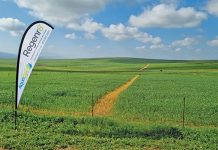Grain SA wants to turn new black producers into established and successful commercial farmers through its Farmer Development Program. According to Jenny Matthews, the board member responsible for this programme, the aim is to create viable, sustainable commercial enterprises for these farmers. Annelie Coleman speaks to her.
How does a girl born and bred in the green hills of KwaZulu-Natal end up getting involved in organised agriculture in Sannieshof, North West?
I met the love of my life at varsity in Pietermaritzburg. I did not even know where Sannieshof was, but fell in love with my husband John and followed him here. I taught for many years locally and eventually ended up as a farmer in my own right. I initially got involved with organised agriculture on branch level. I believe organised agriculture, Grain SA in my case, has a responsibility and decisive role to play in the transformation of agriculture. That is why I am so immensely proud of the Grain SA Farmer Development Program and the potential it constantly unlocks in our country.
W hat does the Farmer Development Program entail? Every country has a farmer development programme, as the nature of farming is so diverse that there always will be newcomers in need of training and support. The Grain SA programme was born out of an initiative by commercial grain producers to support previously disadvantaged farmers and assist them in running viable, sustainable and commercial farming enterprises. I do not like the terms “emerging” or “developing” farmers and find it insulting to experienced people who have achieved great things in their own right, such as the programme’s Farmer of the Year Award finalists.
What are the long-term objectives? We have two critical approaches: we focus half of our energy on excellent training for new farmers and the other half on placing facilitators in the field to run study groups, farmer days and trials, and on mentorship to a select group of advanced farmers. It is critical to ensure the transfer of land is effective to maintain productivity. It goes without saying that we need good farmers who are productive and successful to ensure truly efficient transformation. Ultimately, I believe there is also a role for Grain SA to play as a watchdog organisation as our team can lobby for better conditions for new farmers. We need to see more economic farming units placed in the hands of individuals with the capacity to rise to the challenge of running a farm as a profitable business. The communal farms have largely been a dismal failure and have left many individuals disillusioned and frustrated.
What role are so-called emerging farmers to play in South African agriculture? We need new black producers to become successful farmers. We need them to understand the global scenario surrounding grain production; we need them to feel the same stresses that all commercial farmers feel; we need them to be affected by tariff regulations; we need to fight together for market access to develop new market opportunities; we need to be able to stand together as grain farmers who feed this country; we need to speak with one voice and lobby with one voice and knock on government doors with one shared goal, because the time has passed where a small group of white commercial farmers alone can effect positive changes to benefit the grain producers of our country.
What are your views on transformation in agriculture? I believe transformation is an essential process. Since I have been involved in the Grain SA Farmer Development Program, my experience has been that the majority of white commercial farmers recognise and support the transformation process. The general feeling among producers is that we must do everything possible, in our own right as well as collectively through our organisation, to find the most efficient ways to assist new farmers. I have three sons who would like to farm with us one day and I believe that a stable, successful agricultural environment is essential to instill confidence for our future farmers, no matter what creed or colour.
Please elaborate on the issue of sustainability. This is unquestionably our biggest challenge. There are so many issues affecting even well-established farmers that threaten month-to-month survival. The global village has invaded the agricultural sector and forces us to compete with producers all around the world, many of whom are given generous subsidies by their governments. We participate in a highly volatile market which is no longer only influenced by local variables such as weather, consumption and so on – nowadays even the rain in the American Midwest directly impacts on our prices.
If it is increasingly difficult for experienced, established farmers to survive, then how much more difficult is it going to be for new farmers? Government needs to become far more efficient at ground level in terms of extension services, improved infrastructure and on-farm support. I ultimately believe government has a responsibility to create a friendlier policy environment for security and to improve the prospects of primary producers.
Your last words on the programme? The programme, managed by Jane McPherson, is diverse and dynamic and aims to assist the development of farmers as entrants into the field of commercial farming. As an educator and farmer, I am convinced we are achieving success and I am proud of what is being done. I am excited by the incredible goodwill that follows the team wherever it goes. The truth is that we meet dynamic and interesting people who are hungry for knowledge and are willing to work hard to make a success of the opportunities they have been given. This journey has just begun and already the programme is making a difference, although much work still needs to be done. For more information contact Jenny Matthews on 082 805 6851. |fw








